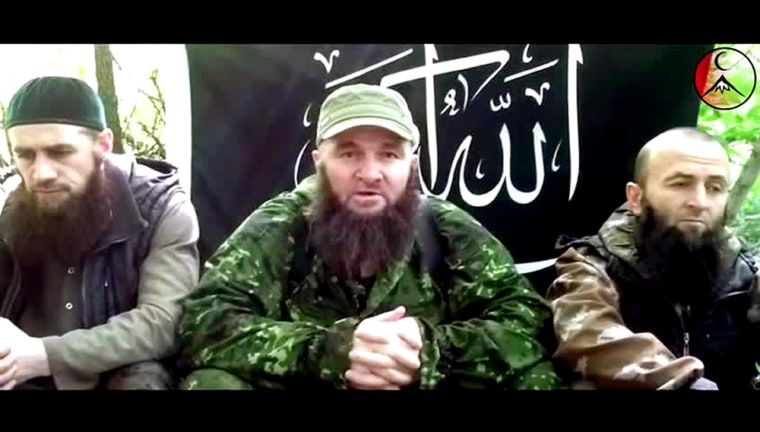A trio of deadly bombings in Volgograd ahead of the Winter Olympics has focused new attention on notorious Chechen warlord Doku Umarov, who has claimed responsibility for a wave of similar terrorist attacks in the name of Islam and vowed to stop the Sochi Games.
In a video statement this summer, the self-proclaimed emir of Caucasus declared that holding the global sports spectacular in the Black Sea resort amounted to "demonic dances on the bones of our ancestors" and said his band of rebels would "use all means" to derail the event.
A security clampdown at Sochi makes a major assault at the actual Olympic Games unlikely, some analysts say, but Volgograd — some 600 miles northeast of Sochi — is the biggest city in the region and a transit hub. Two of this week's bombings have targeted public transportation, which may give travelers from across Russia and around the world the jitters.
"The most likely suspect is either Umarov or some group connected to him," said David Satter, a Russian scholar at the Hudson Institute. "It's all very worrisome."
No one has taken credit for the Volgograd carnage, and it's not clear how much direct control Umarov, who is about 49, exercises over the loosely knit coalition of autonomous Islamist groups in the so-called Caucasus Emirate that could be to blame.
But experts say the cabals under his umbrella share a common goal — global jihad — and he has become the camera-ready face of that ideology in the region.
His early history is murky — he claims his parents were part of the Chechen intelligentsia and there are reports he got an engineering degree or did prison time — but he joined the insurgency against the Russian Federation in 1994 and fought in the second war that began in 1999.
He rose through the ranks of the Chechen independence movement until he split off from some of his old political allies in 2007 and announced a new religion-based mission: to unite Northern Caucasus into a single Islamic state ruled by Sharia law.
"Today in Afghanistan, Iraq, Somalia, Palestine, our brothers are fighting," he said at the time. "Everyone who attacked Muslims wherever they are are our enemies, common enemies. Our enemy is not Russia only, but everyone who wages war against Islam and Muslims."
Although he had rejected terrorism in a 2005 interview, in his new role he soon embraced sabotage and attacks on civilians, arguing it was justified by the government's brutal crackdown on separatists.
In August 2009, a group linked to him claimed it had bombed the Sayno-Shushenskata hydro-electric plant in Siberia, killing more than two dozen people, though the government later insisted it was an accident.
Three months later, Umarov's separatists said they had orchestrated a blast that derailed the high-speed Nevsky Express train between Moscow and Saint Petersburg, killing 27 people.
That was followed by the March 2010 suicide bombings of the Moscow subway, which killed 39 people. Umarov said it was retribution for the death of four garlic-picking villagers at the hands of security forces.
His message to Russians at the time: "I promise you that war will come to your streets and you will feel it in your lives, feel it on your own skin."
Umarov also claimed he ordered the suicide bombing at Moscow's Domodedovo International Airport, which killed 36 people in February 2011.
"More special operations will be carried out in the future," he said in a video posted on the Internet.
"Among us there are hundreds of brothers who are prepared to sacrifice themselves. ... We can at any time carry out operations where we want."
The father of six — who retired as emir in 2010 only to change his mind days later — was even allegedly behind a plot to kill Russian President Vladimir Putin that was reportedly foiled in 2012.
Andrew Kutchins, a senior fellow at the Center for Strategic and International Studies, said Umarov has not been definitively tied to some of the attacks and "sometimes he may be talking more game than he has."
"He hasn’t been able to establish the authority over a network as successfully as someone like Osama bin Laden," Kutchins said.
"He's kind of a publicity hound for sure. Just how operationally effective he has been is impossible to say."
Several times, Russian and Chechen officials have claimed Umarov was dead. But despite taking a bullet to the jaw and stepping on a landmine, he survived to to make his most audacious threat in July — that he would stop the Sochi Games.
"Sochi has been under virtual lockdown and to penetrate that is going to be very, very difficult," Kutchins said. "But to create a sense of terror in Russia and outside Russia about the Games could very well likely be the goal.
"We may be seeing the beginning of a series of terrorist attacks to terrorize the country -- to lead some delegations to think about not attending the Games, to cast a dark shadow over Vladimir Putin's leadership and his claims he has brought security and stability to Russia."
Related
Rush-hour blast kills 14 in Volgograd, Russia; 3rd deadly attack in four days
